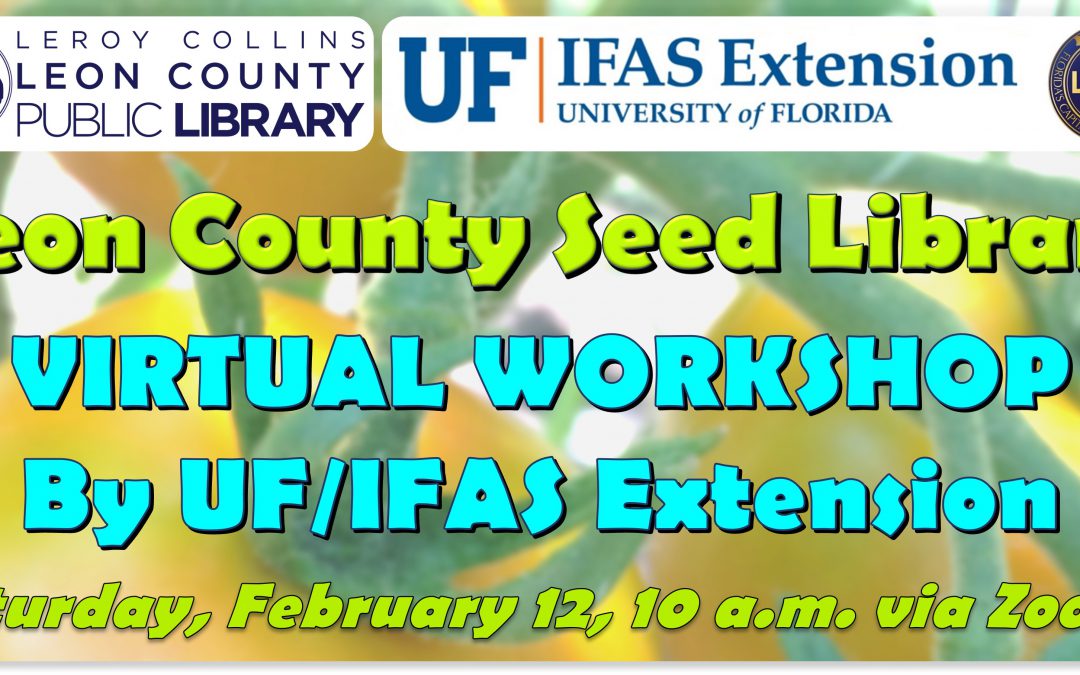
by Molly Jameson | Feb 10, 2022
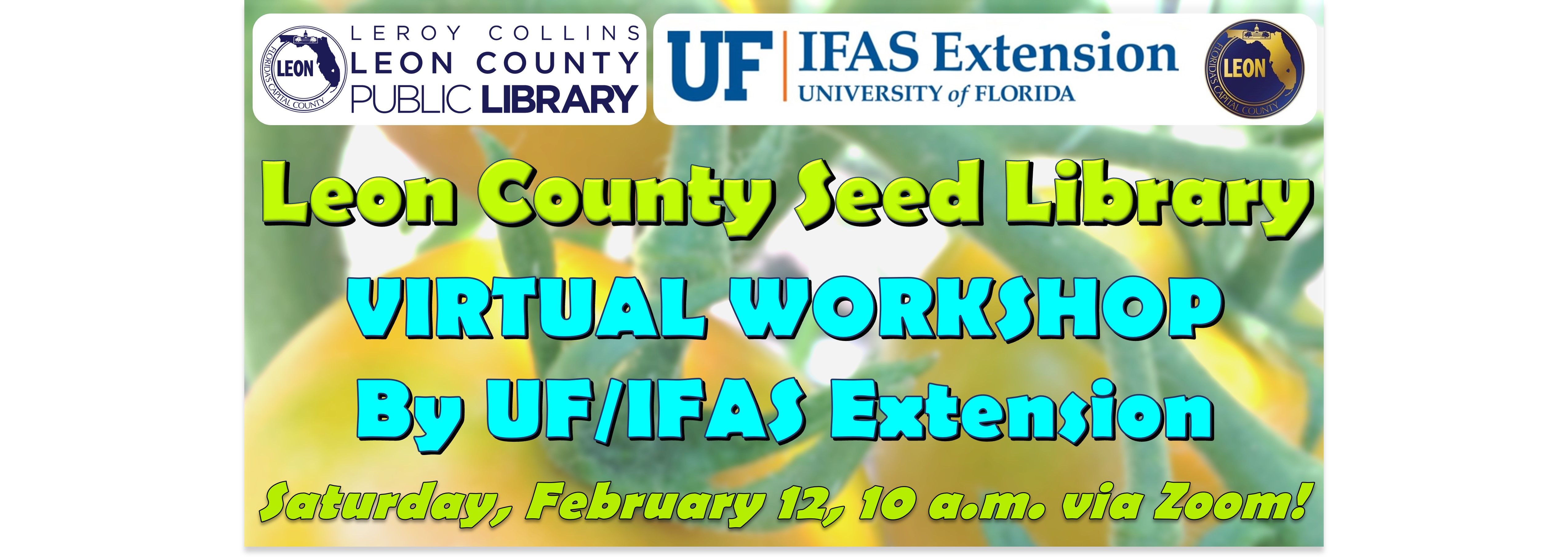
Join us via Zoom on Saturday, February 12, for our Leon County Seed Library Virtual Workshop. Graphic by Molly Jameson.
Believe it or not, spring is right around the corner! For gardeners, this is the time to start thinking about our spring season garden plan and starting seeds. Many spring vegetables, such as tomatoes, benefit from an early start indoors or in a greenhouse, planted in containers. This gives them a greater chance to avoid the intense heat of summer and beat many insect and disease life cycles.
Need seeds to start your garden? Well, if you live in Leon County, you are in luck. Starting Saturday, February 12, 2022, residents of Leon County can “check out” up to three sample seed packets per month with their library card as part of Leon County’s Seed Library Program. The vegetable seeds can be checked out from any of the seven library branch locations. Leon County residents can apply for a library card online at the LeRoy Collins Leon County Public Library online card application page (https://lcpl.ent.sirsi.net/custom/web/registration/).
Here are the vegetable seed varieties that will be available starting February 12:
- Mammolo Basil. Mammolo basil has an Italian aroma and a bushy, compact growth habit that is great for containers.
- Maxibel Haricot Vert Beans. Maxibel Haricot Vert produces prolific beans with long, slender pods and tender texture.
- Natsu Fushinari Cucumbers. Natsu Fushinari is a deep green Japanese-type of cucumber with eight-inch fruit and glossy skin. It has resistance to diseases in high heat.
- Little Fingers Eggplant. Little Fingers eggplant produces clusters of tender, long, deep purple fruit that can be harvested small or large.
- Pinkeye Purple Hull Southern Peas. Pinkeye Purple Hull Southern is a semi-bushy, early-season pea that produces prolific dark purple pods. It has resistance to many diseases.
- Bull Nose Peppers. Bull Nose is an old pepper variety, dating back to the mid-to-late 1800s, and has medium to large, sweet fruit that is great for cooking or salads.
- New Zealand Spinach-like Greens. New Zealand spinach is not a true spinach, but it loves the heat and produces succulent leaves that are excellent cooked or fresh in sandwiches.
- White Scallop Squash. White Scallop is a high-yielding Native American heirloom that produces scallop-shaped fruit great for frying or baking.
- Homestead 24 Tomatoes. Homestead 24 is a semi-determinate tomato that has medium to large red fruit developed for hot, humid climates, making it great for Florida gardens.
- Amy’s Sugar Gem Tomatoes. Amy’s Sugar Gem grows tall, vigorous vines and produces sweet, large red cherry tomatoes.
- Moon and Stars Watermelon. Resembling the night’s sky, Moon and Stars watermelon has a dark green rind with bright yellow spots. It has speckled yellow leaves and seedy, but very sweet, bright red flesh.
Whether you are located in Leon County or not, everyone is welcome to join us Saturday, February 12, from 10:00 a.m. to 12:00 p.m., for our Leon County Seed Library Virtual Workshop. Via Zoom, agents with UF/IFAS Extension Leon County will discuss spring vegetable gardening techniques and healthy eating. There will also be a live cooking demonstration showing how to prepare healthy meals and snacks at home, featuring vegetables available in the Spring 2022 Seed Library Program.
For more information about the Leon County Seed Library Virtual Workshop, please visit our Eventbrite page: https://seedlibraryworkshop2022.eventbrite.com. There is no cost to attend the workshop, but registration is required.
Happy spring gardening!
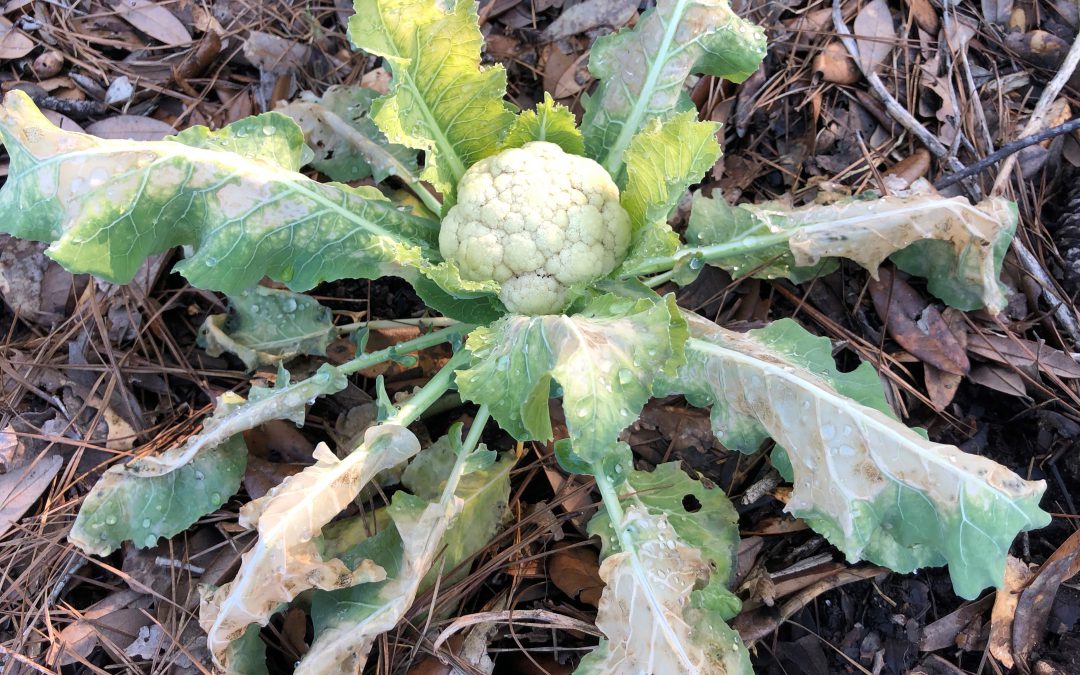
by Molly Jameson | Dec 10, 2021
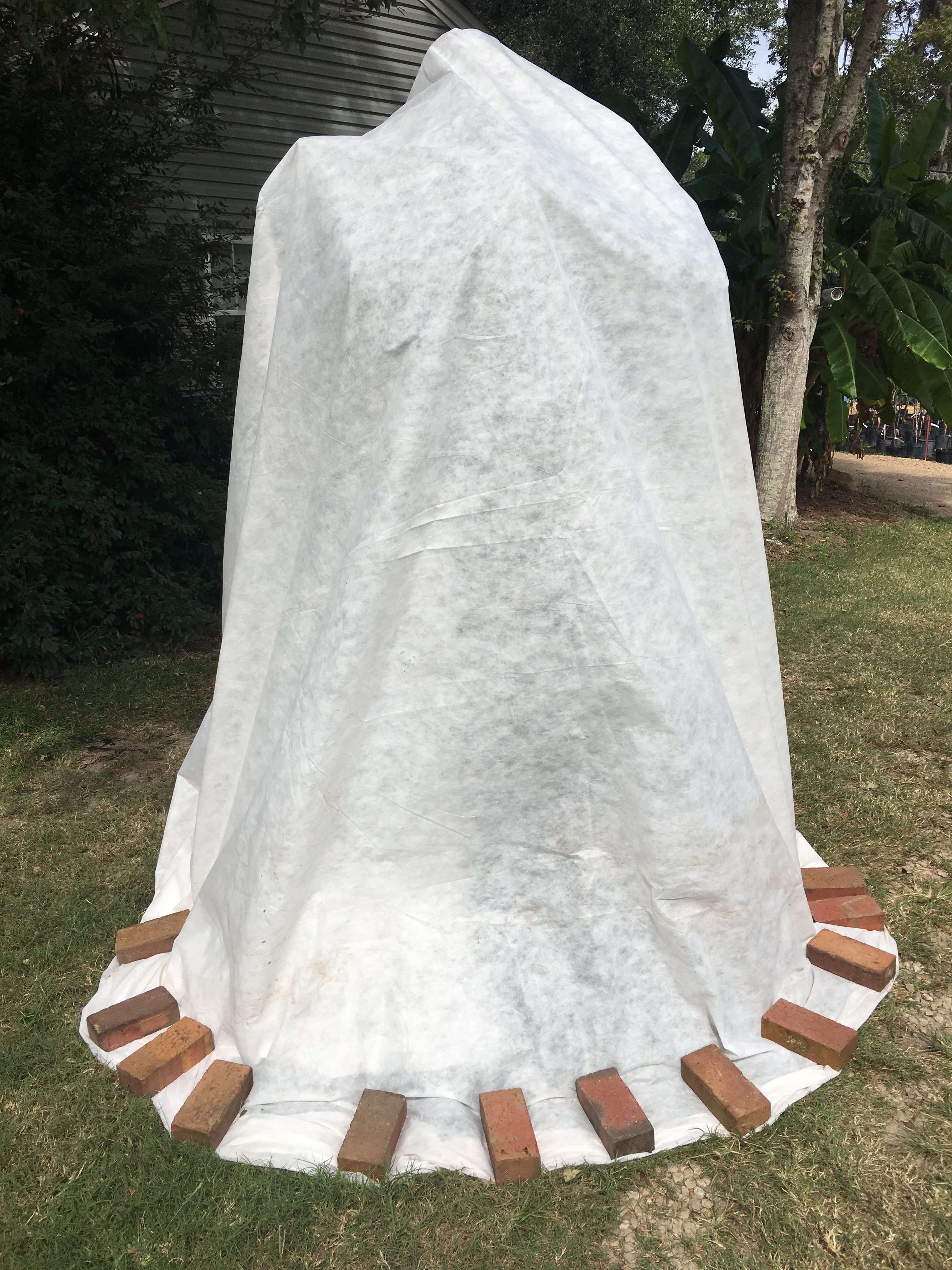
Use frost cloth to completely cover cold sensitive plants. Be sure to make complete contact with the ground and use heavy objects to keep the fabric secure. Photo by Jonathan Burns.
One major aspect that separates North Florida from South Florida is the discrepancies in air temperature. Although the differences are relatively small when comparing Florida with northern states, they can mean a world of difference in the plant world.
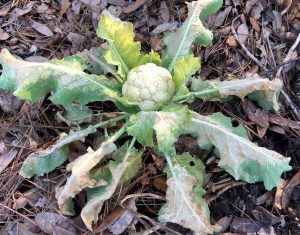
Even hardy cauliflower leaves can be damaged by cold winter nights in the Florida Panhandle. Photo by Molly Jameson.
In most of North Florida, our USDA plant hardiness zone is 8b, which means average minimum winter temperatures are between 15 and 20° Fahrenheit (F). We therefore can experience hard freezes, which happens when temperatures are below 28°F for over five hours. These types of conditions are capable of “burning” the leaves of even the toughest winter vegetables.
Fortunately for our winter gardens, average minimum winter temperatures are in the lower 40s, high enough not to damage winter garden crops. When we do have lows close to or below freezing (32°F), there is one very cost-effective method that can help keep crops and landscape plants protected. This is the use of a material called frost cloth.
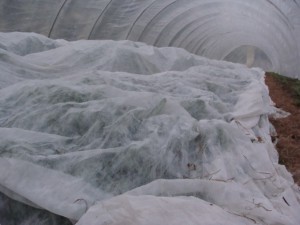
Frost cloth can moderate air temperatures six to eight degrees. Photo by Turkey Hill Farm.
Frost cloth, which can be purchased at most plant nurseries, is a breathable polyester fabric that is light weight and heat retentive. When used correctly, it can moderate air temperatures about six to eight degrees. This is typically all that is needed to get us through our mild North Florida winters. It is also relatively inexpensive, and if cared for, the same cloth can be used for many winter seasons.
Large blankets or bedsheets can be used as frost cloth substitutes, but whether you are using actual frost cloth, or something pulled from the linen closet, it is very important to use it correctly to be effective. The cloth must touch the ground at all points, as it works by trapping heat that radiates from the soil. It also increases the humidity around the plant, aiding in temperature moderation.
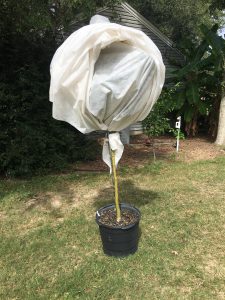
“Lollipop” trees will allow the heat from the ground to escape, giving the tree no cold protection. Photo by Jonathan Burns.
For sensitive landscape plants and fruit trees, it can be more difficult to fully cover the plant with the frost cloth to trap the heat, but it is just as important. When driving around town on a cold night, I inevitably encounter a few “lollipop” trees. This is when the foliage of the tree is wrapped in frost cloth, but the cloth does not reach the ground, and is typically tied off at the upper trunk of the tree. All heat moving upward from the soil will go right around the cloth, giving the tree essentially no protection.
Wire or PVC hoops can be used to help secure frost cloth and keep the cloth from damaging sensitive plant stems and leaves. Bricks, sticks, soil, or garden staples should be used along the perimeter of the frost cloth to prevent nighttime gusts from blowing the cloth off your garden beds or landscape plants. In the morning, remove the cloth once air temperatures reach about 50 to 60°F.
To learn more about cold protection, check out the UF/IFAS EDIS publication, Cold Protection of Landscape Plants (https://edis.ifas.ufl.edu/publication/MG025).
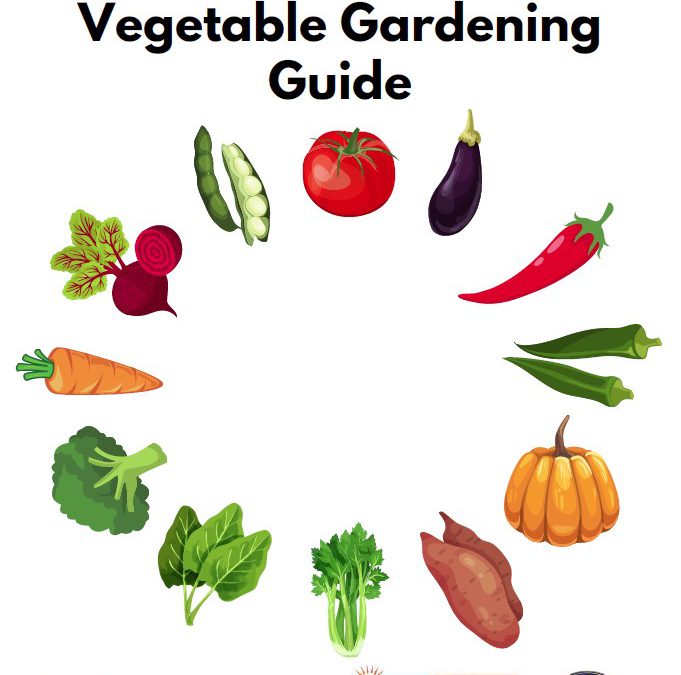
by Molly Jameson | Oct 28, 2021
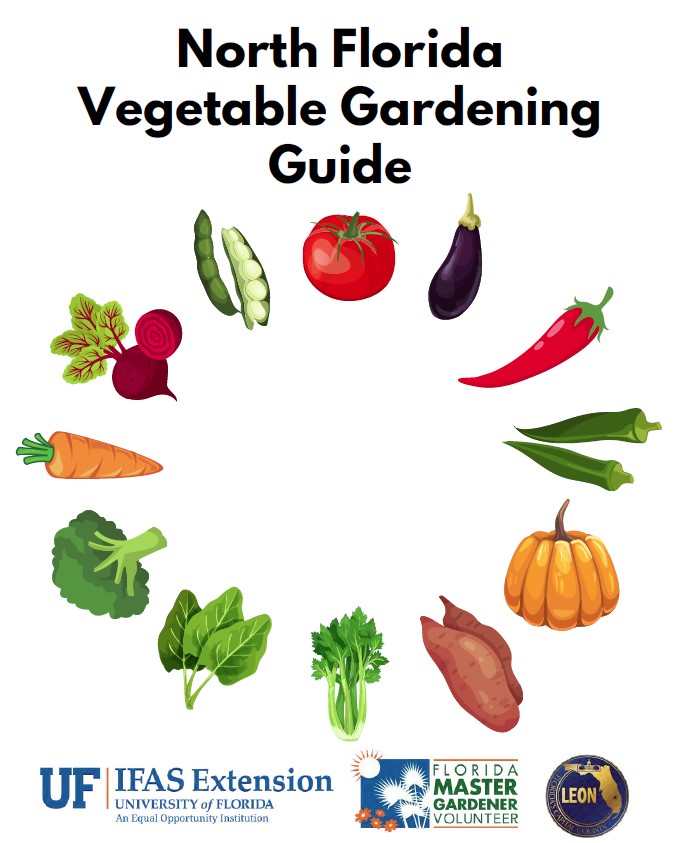
As you garden this fall, check out the North Florida Vegetable Gardening Guide, compiled by UF/IFAS Leon County Extension.
Getting into vegetable gardening, but don’t know where to start?
Even experienced gardeners know there’s always more to learn. To help both beginners and advanced gardeners find answers to their questions, the UF/IFAS Leon County Extension Office put together the North Florida Vegetable Gardening Guide. It incorporates multiple resources, including articles, planting calendars, photos, and UF/IFAS EDIS publications.
The North Florida Vegetable Gardening Guide covers the many aspects of vegetable gardening, including how to get started, site selection, insects and biodiversity in the garden, soil testing, composting, cover crops in the garden, irrigation, and more.
You can click here to view the digital version of the guidebook. We also have physical copies of the guide available at the UF/IFAS Leon County Extension Office (615 Paul Russell Rd., Tallahassee, FL 32301).
Happy fall gardening!
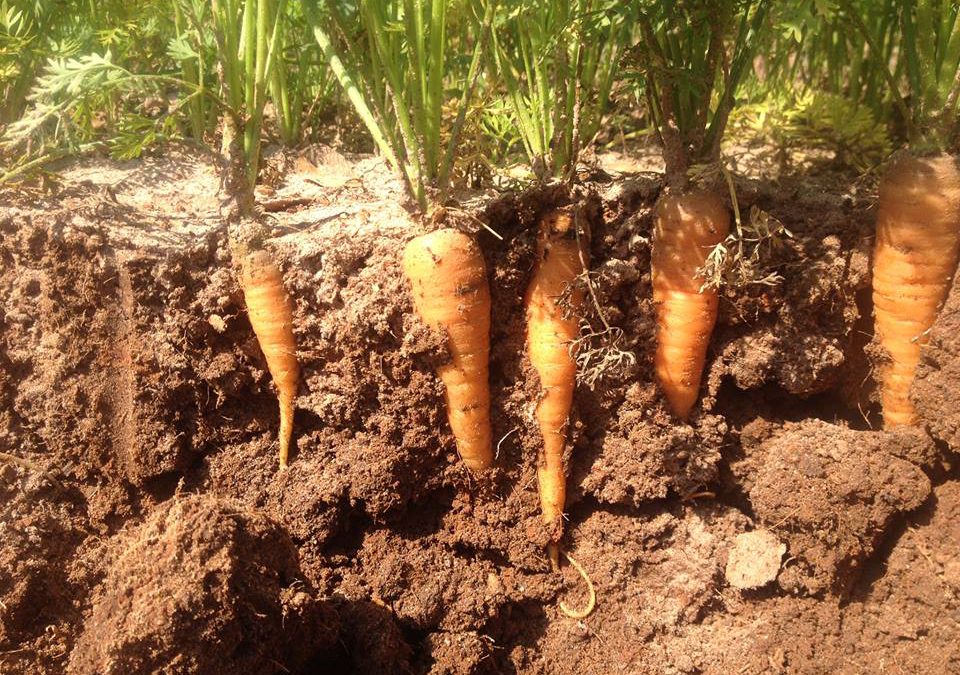
by Molly Jameson | Aug 18, 2021
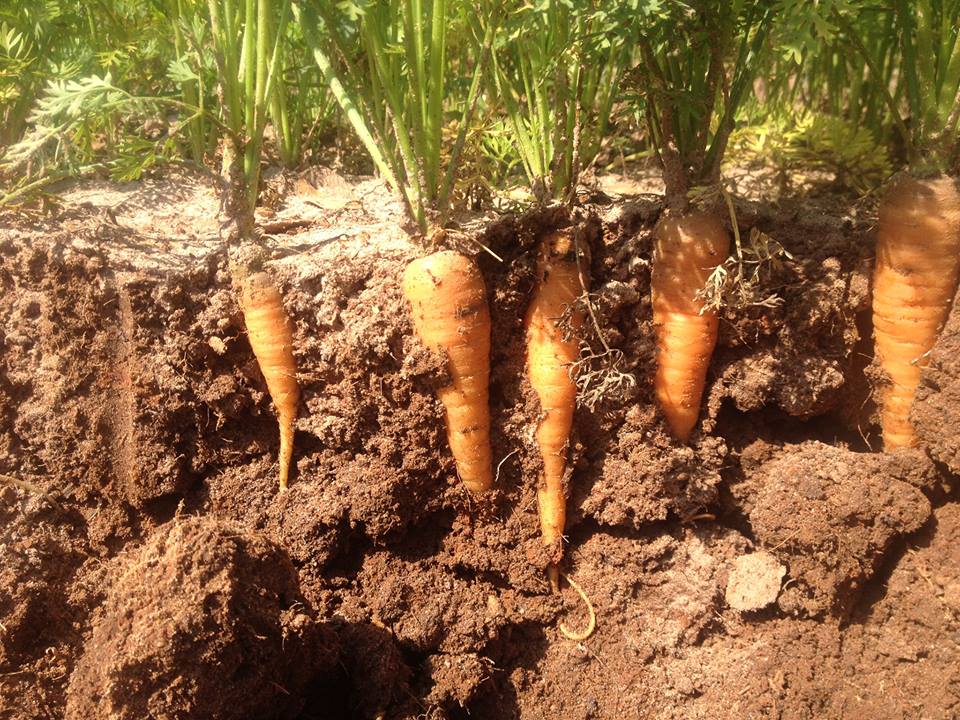
Carrots need enough space so as not to compete for light, nutrients, or moisture. Photo by Full Earth Farm.
Of all the garden veggies, carrots are very close to the top of my list of favorites to grow. They can be directly seeded into the garden, need no pruning or staking, can hold up magnificently in the cold, have few pest problems, are easy to harvest, can be eaten raw or cooked, and they are, of course, delicious.
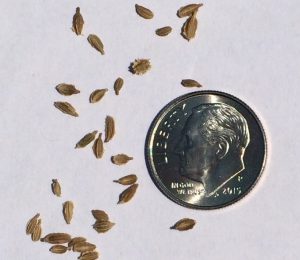
Hand-seeding carrots can be a challenge, as the seeds are very small. Photo by Molly Jameson.
Carrots are in the Apiaceae, or umbel family, along with cilantro, celery, fennel, parsley, and dill. Flowers in the umbel family grow as short flower stalks which spread from one point, like that of an upside-down umbrella, hence their name. If the carrot root is not harvested, the plant will produce beautiful umbrella-like inflorescences the following year, as carrots are biennial.
When planting carrots, there are some important aspects to keep in mind. Here in Florida, carrots thrive in our cool season. They prefer soil temperatures to be less than 80°F for good germination and air temperatures below 75°F for best growth. Therefore, waiting until mid-September through October to seed will yield better germination and growth.
One of the biggest mistakes one can make in the garden is neglecting to thin seedlings. And carrots – whose seeds are a mere millimeter in length – are one of the prime culprits.
An individual carrot needs one to three inches of soil space, depending on the variety, to grow to full maturity and not compete for light, nutrients, or moisture. This, however, does not mean that you must only plant one carrot seed per one to three inches. In fact, carrots should be seeded one-half inch apart, especially when day temperatures are above 75°F, as you may have spotty germination. But the key is proper thinning. Carrots take between seven to 21 days to germinate, so be sure to give them time, and be sure to keep the area consistently moist, but not water-logged.
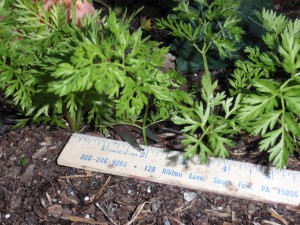
Depending on the variety, carrots need one to three inches per plant. Photo by Beth Bolles.
Once germinated, it is crucial to make your first thinning. Find the seedlings that are less than an inch apart and simply cut their stems at the soil line using either a sharp fingernail or garden sheers. Depending on the variety of carrot and seeding density, you may need to make another thinning to ensure the carrots have enough room to prosper.
I know it can be emotionally challenging to remove growing seedlings from your garden – but remember – it’s for the greater carrot good!
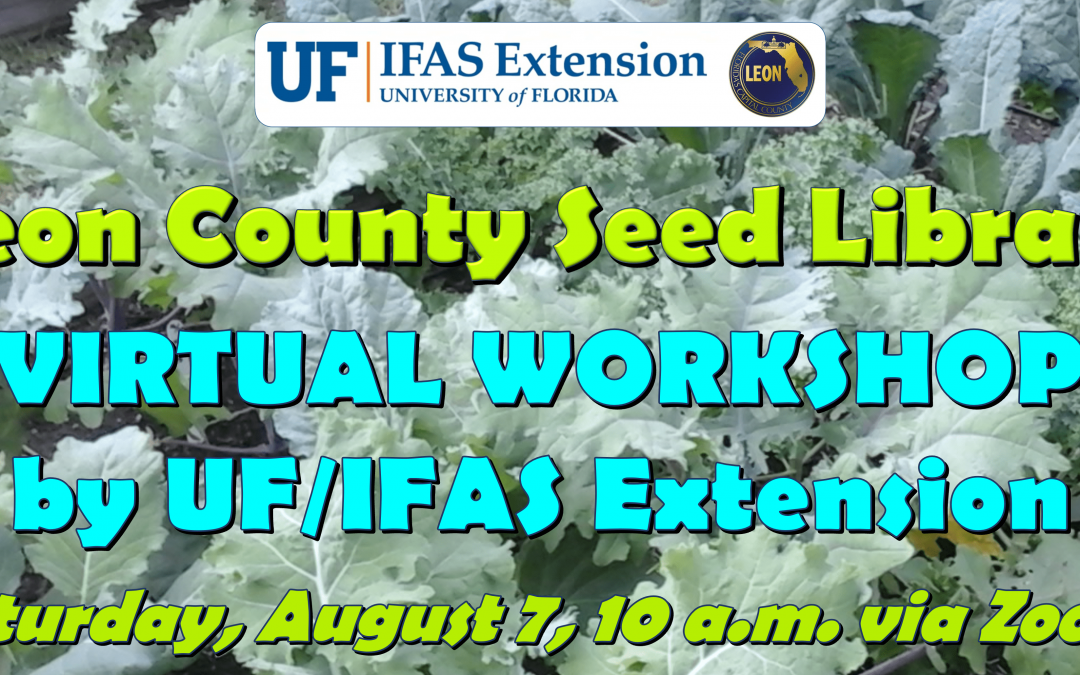
by Molly Jameson | Jul 15, 2021
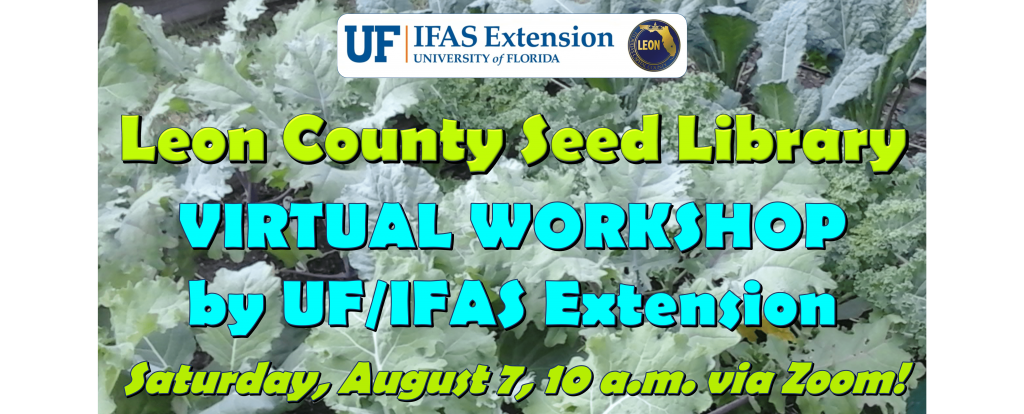
Join us via Zoom on Saturday, August 7, for our Leon County Seed Library Virtual Workshop. Graphic by Molly Jameson.
Join Us August 7 for the 2021 Leon County Seed Library Virtual Workshop
Planting vegetable seeds and growing a garden is a great way to get outdoors and appreciate nature. Since 2015, the Leon County Public Library has supported gardeners in Leon County by providing vegetable seed packets for patrons to take home and plant in their gardens.
To kick off the Fall 2021 Seed Library, agents with UF/IFAS Leon County Extension are hosting the Leon County Seed Library Virtual Workshop on Saturday, August 7, from 10:00 a.m. to 12:00 p.m. via Zoom.
During the virtual workshop, Extension agents will discuss planting seeds, growing vegetables, and how to incorporate veggies into healthy meals and snacks. The workshop coincides with the first day the seeds in the Fall 2021 Seed Library will become available. Residents of Leon County can check out three sample seed packets per month with their library cards from all Leon County library branches.
Even if you are not a resident of Leon County, everyone is welcome to join us at the virtual workshop. Along with the gardening portion of the workshop, there will also be a live virtual cooking demonstration featuring vegetables available in the Fall 2021 Seed Library Program.
For more information about the Leon County Seed Library Virtual Workshop, please visit our Eventbrite page: https://seedlibraryworkshop2021.eventbrite.com. There is no cost to attend the workshop, but registration is required.
If you are a resident of Leon County, all you need is your Leon County library card to check out the vegetable seeds. Don’t have a library card? No problem! Leon County residents can apply online at the LeRoy Collins Leon County Public Library online card application page here: https://lcpl.ent.sirsi.net/custom/web/registration/.
Here is the list of the vegetable seed varieties that will be available starting August 7: Common Arugula, Waltham 29 Broccoli, Chantenay Red Core Carrots, Michihili Chinese Cabbage, Slo-bolt Cilantro, Alabama Blue Collards, Early White Vienna Kohlrabi, Rocky Top Salad Blend Lettuce, Pink Beauty Radishes, and Tokinashi Turnips.















